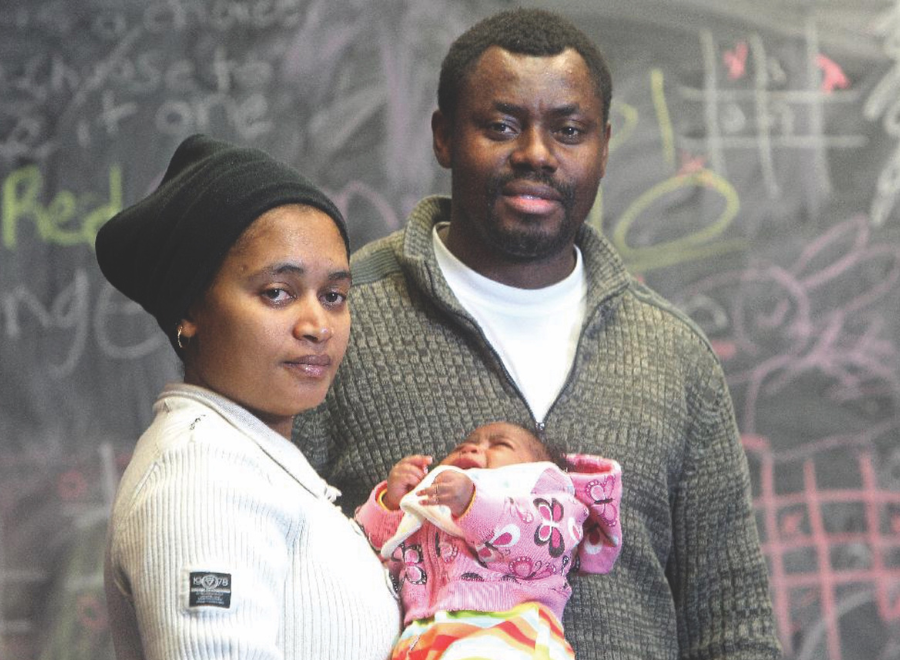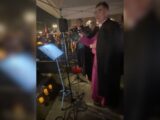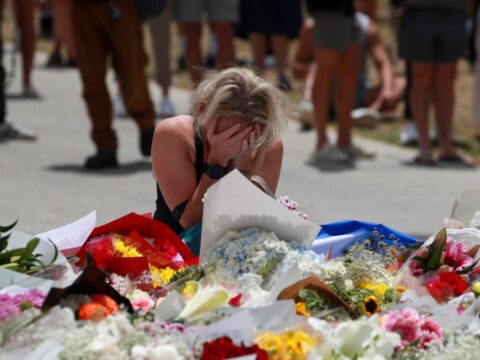Two-month-old Ibtisam is fast asleep, bundled up in a brown blanket, nestled into a car seat, in the safe comfort of a room at Southwood United in Calgary. She is a picture of tranquility and completely oblivious to the terrible violence her mother and father escaped just six months before her birth.
Her parents, Ghyslain and Jasmin Saliboko, sit nearby, recounting their tale of terror, loss, death and displacement — and the long journey that led them to the doorstep of a United Church congregation that’s passionately committed to the biblical call to welcome the strangers in its midst.
You may unsubscribe from any of our newsletters at any time.
Last June, the Salibokos were attending a Pentecostal church service in their village near Uvira in eastern Democratic Republic of Congo when a group of militia men in stolen military uniforms stormed the building armed with knives and assault rifles. A United Nations report attributed the violence to an inter-ethnic conflict sparked by a dispute over cattle. But the region, rich in minerals and surrounded by mountains, is no stranger to violent outbreaks. Several rebel groups are based here.
Ghyslain watched in horror as his father, Ibrahim, was gunned down. When the violence ceased, 37 people — including young children — were dead. Some had been shot; others were set on fire. The Salibokos’ four children — five-year-old daughter Ibtiham and 10-year-old son Ibrahim, as well as two older children in their care following a relative’s death — ran away. The couple have not seen them since and are currently working with various agencies, including the Red Cross, to locate them. Escaping the terrifying scene, the Salibokos ran through the jungle for hours.
Their journey led them to a compound in a neighbouring town where they met a missionary, someone who, by pure coincidence, realized Ghyslain’s father had helped him when he first came to Congo about 30 years previously. The missionary promised to help the couple find their way to a safe country.
“From there on, he really didn’t keep them in the loop of how he was going to do that, in part because if he was caught he would be in trouble and all the people in between would be in trouble,” explains Rev. Ed Lewis, senior pastor of Southwood United.
The Salibokos are both 37 years old — he was a baker, while she raised their children. They had never been on a plane before or even ventured much beyond their hometown. Most of the details of their journey to Canada remain vague, likely a combination of trauma disrupting their memories, fear for their safety and that of their handlers, and simply being kept in the dark. “I think they realized that if they were caught, they would be forced to go back to the Congo,” says Lewis.
They eventually ended up in Toronto in early October, where they were picked up by a man and driven three days and three nights to Calgary.
Southwood United was the second church in Calgary they were driven to on their journey. Its parking lot was full, indicating people were in the building. So the man dropped off the Salibokos and drove away. They stood in the lot — Jasmin, seven months pregnant at the time, holding a single suitcase with all their possessions.
It was a Wednesday afternoon at about 3 p.m., and the small groups inside the church were just finishing their meetings. Someone came out, saw the Salibokos standing there with the suitcase, and went back inside to fetch Nothando Lambati, church custodian and a member of the pastoral team for international ministries.
When she came out, she realized they spoke the same language — Kiswahili. Lambati brought the couple into the church and heard their astonishing story.
Lewis was out at the time but returned to the church about an hour later. “First of all you’re in shock,” says the pastor. “Then you start to think, ‘Oh my gosh, what will it take to help a family who are refugees who don’t speak our language?’”
While he was initially struck by the hurdles — “How are we going to be able to help them in these things we’ve never experienced before?” — Lewis says the church is no novice when it comes to taking action. “We do a fair amount of work in global missions, including a school in Kenya we fully fund for at-risk young women. So the congregation already thinks of global issues and how we can have an impact from a church in Calgary into other places.
“When this couple landed on our doorstep — literally — and we realized they were refugees from a very difficult situation, we didn’t have a choice. We just knew that God had placed them here, and we could help them get the accommodation they needed, get them into the process of the immigration hearings, legal fees paid — all that kind of stuff,” Lewis continues. “Everyone pitched in. And they’ve been embraced as part of our family.”
Southwood United is a mid-sized church in a quiet residential neighbourhood with about 225 people attending on a Sunday morning. But it thinks big. The first Sunday the Salibokos attended, 10 people from the congregation volunteered to help them through the immigration process. When the Salibokos lost their first attempt at gaining refugee status, 200 people signed a petition on their behalf. When they needed $6,000 for the legal fees for the appeal process, it was raised in one day. A lawyer has been retained, and Lewis says a decision is expected in May.
“There are a lot of Old Testament passages where the Israelite people are told to embrace people who are lost, who are strangers, who are refugees and bring them in because that is an expression of your compassion and the love that God has given to us. That’s the biblical mandate, and our church really believes it,” he says.
Faith has always been an important part of the Salibokos’ lives too: Ghyslain is Christian; Jasmin is Muslim.
At any time throughout this journey, did they question their faith? Did they wonder where God was in this horror and upheaval? “As a person you ask questions. But what I kept telling God was, ‘Help me get through this ordeal,’” says Ghyslain through Lambati’s translation, adding that they prayed constantly. “I asked questions. But asking God questions is a little bit hard. You just tell God what is happening, and He is the one who is supposed to take over.”
Ghyslain describes Southwood’s response and generosity as a “wonder” and “extraordinary. . . . It has taught me that I should be able to love people. Even if I have love, there’s the other love that goes beyond, and that is what the church has been doing.”
For the first six weeks, the Saliboko family stayed with Lambati and her husband — also a refugee from Congo about 25 years ago. Then they moved to someone else’s home, closer to the church. Ghyslain has been offered a job by a member of the congregation once his legal papers come through. In the meantime, he does work around the church — not for money but as a gesture of gratitude for the church’s assistance.
“We see these as kind of divine moments where God allows us to express our Christian faith in a tangible way,” says Lewis. “Does it stretch your congregation or people? Of course it does. But the Salibokos have brought so much joy to our church. They are a wonderful couple. It’s been good for our congregation to reach out and embrace them and take them as their own.”
In the Salibokos’ culture, a new child is introduced to the community 40 days after birth. On the first Sunday of February, a traditional celebration was held at Southwood United for Ibtisam, including music, dancing and a feast.
The baby’s name means “smile” in the Salibokos’ language. Jasmin, who doesn’t speak during our interview, communicates the meaning by putting her thumb and finger to the edges of her mouth and stretching it into a wide grin.
“Because of all the things that we have passed through, it’s not a time of grief anymore,” says Ghyslain. “It’s a time of smiling. . . . Sometimes I feel like I’m dreaming.”
***
This story first appeared in The United Church Observer’s April 2015 issue with the title “Strangers in our midst.”














